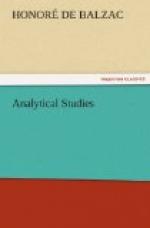Thus, in a bankruptcy, Adolphe, in order to protect himself (this means to recover his claims), has become mixed up in certain unlawful doings which may bring a man to the necessity of testifying before the Court of Assizes. In fact, it is not known that the daring creditor will not be considered a party.
Take notice that in all cases of bankruptcy, protecting oneself is regarded as the most sacred of duties, even by the most respectable houses: the thing is to keep the bad side of the protection out of sight, as they do in prudish England.
Adolphe does not know what to do, as his counsel has told him not to appear in the matter: so he has recourse to Caroline. He gives her a lesson, he coaches her, he teaches her the Code, he examines her dress, he equips her as a brig sent on a voyage, and despatches her to the office of some judge, or some syndic. The judge is apparently a man of severe morality, but in reality a libertine: he retains his serious expression on seeing a pretty woman enter, and makes sundry very uncomplimentary remarks about Adolphe.
“I pity you, madame, you belong to a man who may involve you in numerous unpleasant affairs: a few more matters like this, and he will be quite disgraced. Have you any children? Excuse my asking; you are so young, it is perfectly natural.” And the judge comes as near to Caroline as possible.
“Yes, sir.”
“Ah, great heavens! what a prospect is yours! My first thought was for the woman, but now I pity you doubly, I think of the mother. Ah, how you must have suffered in coming here! Poor, poor woman!”
“Ah, sir, you take an interest in me, do you not?”
“Alas, what can I do?” says the judge, darting a glance sidewise at Caroline. “What you ask of me is a dereliction of duty, and I am a magistrate before I am a man.”
“Oh, sir, only be a man—”
“Are you aware of the full bearing of that request, fair creature?” At this point the magistrate tremblingly takes Caroline’s hand.
Caroline, who remembers that the honor of her husband and children is at stake, says to herself that this is not the time to play the prude. She abandons her hand, making just resistance enough for the old man (happily he is an old man) to consider it a favor.
“Come, come, my beauty,” resumes the judge, “I should be loath to cause so lovely a woman to shed tears; we’ll see about it. You shall come to-morrow evening and tell me the whole affair. We must look at the papers, we will examine them together—”
“Sir—”
“It’s indispensable.”
“But, sir—”
“Don’t be alarmed, my dear, a judge is likely to know how to grant what is due to justice and—” he puts on a shrewd look here—“to beauty.”
“But, sir—”
“Be quite at your ease,” he adds, holding her hand closely in his, “and we’ll try to reduce this great crime down to a peccadillo.” And he goes to the door with Caroline, who is frightened to death at an appointment thus proposed.




